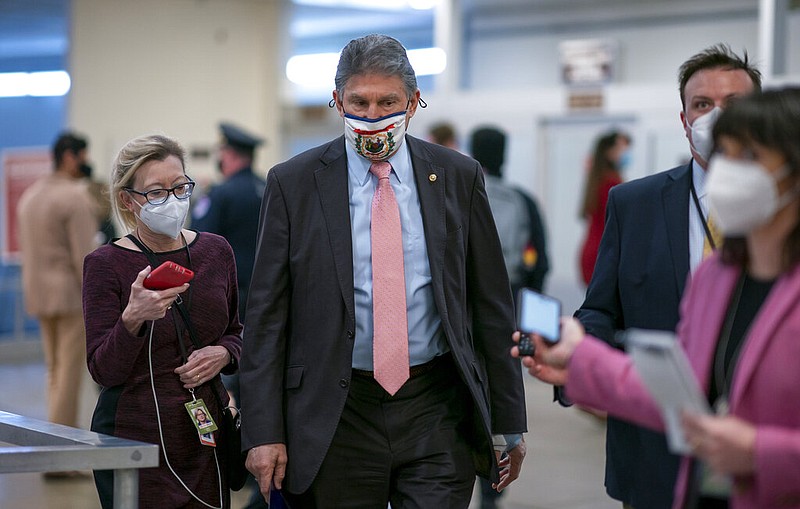WASHINGTON -- Sen. Joe Manchin, D-W.Va., said Monday that he opposes a key part of the White House jobs and infrastructure plan, as early objections across the political aisle threatened to cloud the fate of the $2 trillion proposal.
[Video not showing up above? Click here to watch » https://www.youtube.com/watch?v=yl_f_pgfCh4]
Speaking on a West Virginia radio station, Manchin said he would vote against President Joe Biden's proposal to raise the corporate tax rate from 21% to 28%, instead saying the rate should be set at 25%. Even if all other Democrats support the plan, Manchin's opposition would likely be enough to kill it because the Senate is split 50-50 between Democrats and Republicans.
Former President Donald Trump's 2017 tax law lowered the tax rate from 35% to 21%. Manchin said numerous other Senate Democrats supported his position and that the tax provisions would have to be changed for the bill to be approved.
"The bill, basically, is not going to end up that way," Manchin said Monday. "If I don't vote to get on it, it's not going anywhere. So we're going to have some leverage here. And it's more than just me ... there's six or seven other Democrats that feel very strongly about this."
[Video not showing up above? Click here to watch » https://www.youtube.com/watch?v=GKUqcZ10GXY]
Manchin's criticisms come as Biden's domestic legislative priority takes on a bevy of attacks that threaten to complicate its path to passage. The proposal, introduced last week, has been panned by Republicans for significantly raising corporate taxes and denounced by some liberals as insufficient for the scale of the problem posed by climate change.
Democrats also hold a narrow majority in the House and can't afford even modest defections there if they want any package to pass.
Senate Democrats could try to approve the tax change measure through budget reconciliation -- the parliamentary procedure that allows them to pass legislation with a narrow majority. But a defection from Manchin or any other single Democrat could sink the measure. Objections from other centrist Democrats emerged Monday as well, with Sen. Mark Warner, D-Va., telling reporters he had expressed unspecified concerns to the White House.
Biden's infrastructure and jobs plan calls for devoting more than $600 billion to rebuilding roads, bridges, highways and other physical infrastructure; $400 billion for funding caregiver programs; more than $200 billion to retrofit and rebuild homes; and hundreds of billions for measures such as high-speed broadband, replacing the nation's lead pipes and investing in the electrical grid.
"As the grumbling from Democrats gets louder, it only reiterates this is going to be really tough to do. Not impossible, but really tough to do," said Jim Manley, who served as an aide to former Senate Majority Leader Harry Reid, D-Nev.
The White House has been adamant that Congress approve a major infrastructure and jobs package, while leaving many of the details open to negotiations. On Monday, White House press secretary Jen Psaki said the Biden administration's proposal to raise the corporate tax rate to 28% is a critical element toward paying for the "totality of the package" for infrastructure reform.
She said the increase, if implemented, still would set corporate taxes at a lower rate than they were before the 2017 tax cuts implemented under Trump. But Psaki added the White House is open to negotiating the details further with congressional leaders.
Republican opposition, however, continued to intensify. In an early sign of the gulf between the two parties, Sen. Roy Blunt, R-Mo., told Fox News Sunday this weekend that he believes Biden should dramatically scale back his $2 trillion infrastructure plan to a proposal closer to $600 billion. The new package would focus only on core infrastructure elements like roads, bridges and ports, he said.
But the White House appeared to resist that idea, with Psaki on Monday telling reporters at her news briefing that Republicans have a different "definition" for what qualifies as infrastructure -- a category that she said included fixes to the country's inner workings and proposals to aid the American workforce.
Democrats united to approve a $1.9 trillion relief package in March, but the roadblocks toward approving the infrastructure plan could be significantly larger. The coronavirus pandemic put pressure on lawmakers to act, and Democrats agreed on the need to meet a March 14 deadline to approve aid before unemployment benefits for millions expired. No similarly imminent deadline looms over the infrastructure negotiations.
